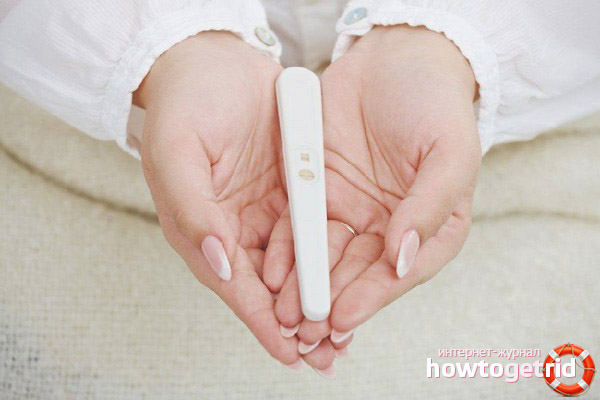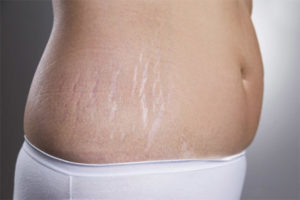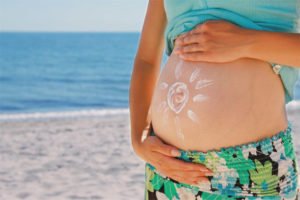The content of the article
The question of the ability to conceive a child during breastfeeding worries a lot of women who are preparing for the birth of a baby and have plans to feed him with breast milk, as well as those whose babies are breastfed.
Most new mothers are confident that lactation provides them with reliable protection against the onset of an unwanted pregnancy. For this reason, any additional contraception is not necessary. Is this really so?
Reasons Lactation Prevents Pregnancy
A natural way to prevent conception, which is called lactational amenorrhea, is based on the fact that breastfeeding is considered an obstacle to the next pregnancy. But sometimes it happens that conception still comes.
After the birth of a child, the restoration of the female reproductive system does not occur immediately. For mothers who are breast-feeding a baby, this period usually lasts much longer than for those who are breast-feeding a baby or have completely switched to artificial feeding. In some cases, this process is fully restored only when breastfeeding is complete. Up to this point, a woman may not have a period at all, but pregnancy can still occur.
This fact is confirmed by both doctors and people who have encountered this in their lives. For this reason, the question of whether conception is possible with lactation can only be answered positively. This happens, first of all, because the first ovulation, which occurs after the birth of the baby before the menstrual cycle is adjusted, may not be noticeable for a woman, and pregnancy will occur precisely during this period. In such cases, conception occurs in approximately 10% of nursing mothers.
When does the method of natural contraception for breastfeeding work?
Of course, the risk that a mother who is breastfeeding becomes pregnant is quite low. During breastfeeding, there is a significant decrease in fertility, that is, the woman's ability to conceive.
During lactation, the female body undergoes intensive production of hormones that inhibit fertility. Among them, there is prolactin, a large amount of which is a barrier to pregnancy when a woman feeds her baby.
If you follow some important rules, you can achieve that the method of natural protection from unwanted pregnancy will become much more effective, as a result of which its degree of reliability will reach almost 99 percent.
First of all, feeding should be carried out at the request of the baby, and not at the prescribed time. This also applies to night hours, while feeding the baby with a mixture, you can not offer him a pacifier or a bottle of water. This means that within 24 hours the baby will have 10 short-term feedings, or 6 long ones. The interval between them will be a maximum of 5-6 hours.
In addition, the reliability of the method largely depends on the age of the child. After 6-7 months, it decreases significantly, since at this time the frequency of feeding can no longer be taken into account, since complementary foods begin to be actively introduced into the baby’s diet, and he does not need so much mother milk.During this period, one should not rely on the fact that breastfeeding will provide protection against the onset of conception. It is recommended to start using contraceptives.
When the mother begins her period again, this will be a sign of her body's readiness to bear the baby again. If a woman does not want to give birth again, then she should provide herself with reliable protection against pregnancy.
Contraception for nursing mothers
For women who breast-feed a baby, the gynecologist may advise the following methods of contraception:
- Oral contraceptive drugs (tablets). During breastfeeding, preference should be given not to combination drugs, but to drugs that contain only one hormone - progestin. A similar medicine is also called "mini drank." It does not affect the quality and volume of breast milk, does not pose a danger to either the mother or the baby. But you can’t use the product without consulting a doctor. The drug can begin to be taken 2 months after the birth of the baby. With the correct and regular intake of such tablets, their effectiveness will reach 98%. It is necessary to strictly follow the instructions and not violate the schedule and time of admission. Combined drugs for breastfeeding are allowed to be used 6 months after birth. They are more suitable for a woman's body, but slightly reduce the production of breast milk. For this reason, the use of such tablets is not recommended in the first months after birth. The effectiveness of this tool reaches almost 100%.
- Barrier methods of contraception (condoms). A simple and affordable method that does not affect the lactation and the body of the mother and child. But the quality of the condom is important here, since the effectiveness of the method depends on it, which varies from 86 to 97%. In addition, if the product is not used correctly, it may break.
- Spermicidal agents (suppositories). The product does not pose a health hazard and is more than 90% effective if used correctly. In addition to candles, there are drugs of the same action in the form of a cream or ointment. The active components of this agent cause destruction of the sperm cell membrane, which leads to impaired mobility or death. The use of such drugs (as well as condoms) is allowed immediately after the birth of the baby. Achieving the desired effect occurs instantly after use, it lasts about 6 hours.
- Intrauterine device. The introduction of this product is carried out only by a gynecologist. If the birth went well, without complications, the spiral can be placed after 1.5 months. The effect remains depending on the type of product for 6-7 years. In this case, if necessary, the doctor can remove it. Reliability of the product reaches almost 100%. Lactation is not a contraindication to its use. However, side effects are possible, which must be consulted by a doctor.
Pregnancy and lactation
If, despite the fact that the mother is breastfeeding, the pregnancy has nevertheless come, then another question arises - should the child be transferred to artificial feeding. If a new pregnancy proceeds normally, it does not affect lactation. And the hormone produced in the mother’s body during lactation does not affect the uterus and does not lead to premature contractions. This means that you can not worry and continue breastfeeding, especially if the baby is not yet one year old.
But you need to take into account such a moment that all vitamins and minerals pass to the child who is fed breast milk, and not to one that develops in the mother’s womb. For this reason, it is advisable to consult a doctor who will lead the pregnancy on this topic.
How to understand that a pregnancy has occurred during breastfeeding
The fact that conception occurred may suggest the following:
- The quality and quantity of milk has changed, as evidenced by the behavior of the baby.
- Milk production declined sharply for no apparent reason.
- Painful sensations appeared in the chest, but this should be taken very carefully, since pain can indicate the occurrence of lactostasis or even mastitis.
- Other signs of pregnancy showed up - delayed menstruation, nausea in the morning, etc.
If the pregnancy is confirmed, you should contact a gynecologist. He will tell you what to do next - how to combine lactation and bearing a child. But do not forget that such a combination will take a lot of effort. Therefore, it is not recommended to plan a second baby so early. It is better that at least one or two years have passed, so that the mother's body is fully restored.
Video: Can I get pregnant with HB?











Submit